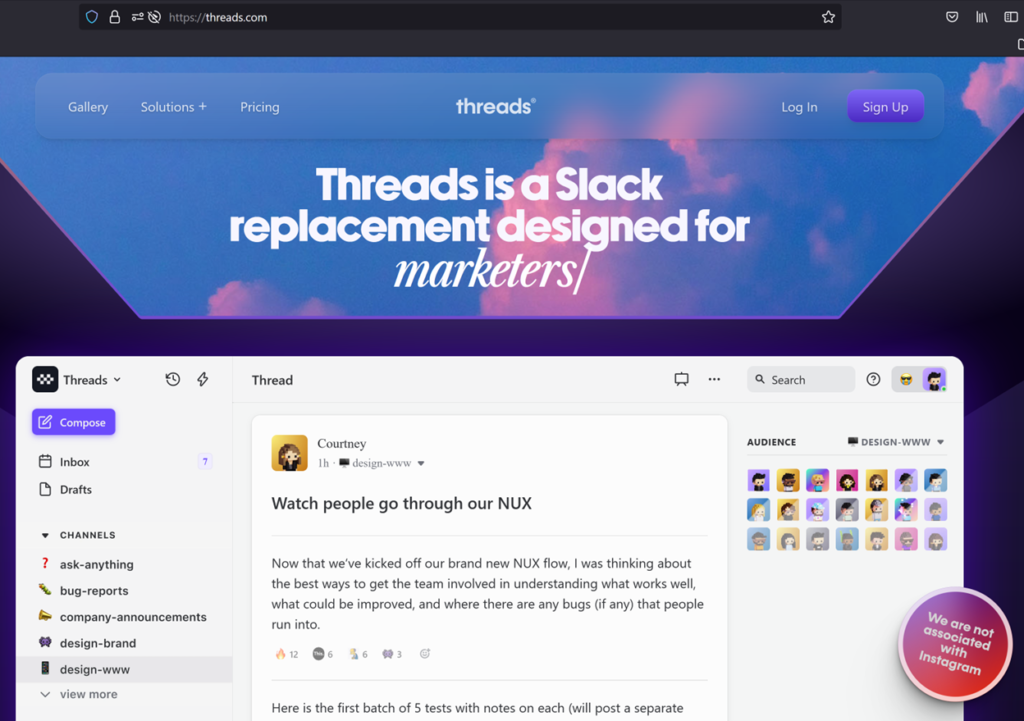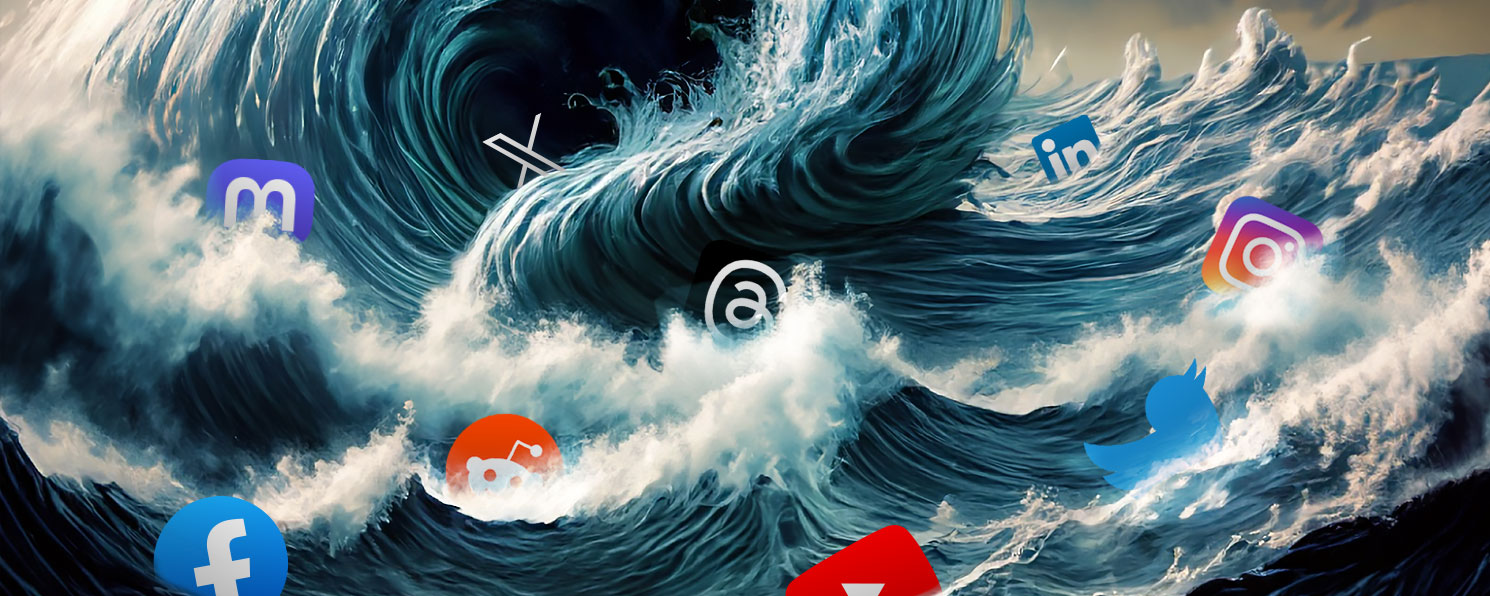There have been many changes in the social media landscape this year, with Twitter (X), Reddit, and Threads all making headlines. Here is a quick recap of the saga and the marketing lessons you need to know for your business.
TURBULENT TIMES FOR SOCIAL MEDIA
2023 has been a year of social media upheaval, with three big players making headlines for their high-profile changes (and missteps). Here is a quick recap if you were not following along with the coverage.
Twitter (X)
In April 2022, a billionaire decided he knew social media best and offered to buy Twitter to prove his point. “Twitter has extraordinary potential. I will unlock it,” he proclaimed.
The billionaire soon changed his mind and tried to withdraw from the $44 billion transaction. However, a lawsuit ultimately forced him to complete the purchase in October 2022.
Twitter’s reluctant new owner next made one hasty and ill-considered business move after another with the social network in the subsequent months. Several tech news outlets, including Vox and TechCrunch, had pages of running updates on the unfolding developments.
In its most baffling step, the company abandoned its immediately recognizable brand name and logo, replacing them with the comic-book-style company name (X. Corp) and a similarly uninspired logo. If I had to offer a business textbook example of squandering established brand value, this would be it.

X does not mark the spot where good marketing decisions get made
Unsurprisingly, the chaos at X has led to users and advertisers abandoning the floundering platform. As of August 2023, the company’s ad revenue has fallen by half.
Meanwhile, over at Reddit, the company’s CEO picked a spectacular fight with the platform’s user base and volunteer cadre of moderators earlier this year.
For anyone unfamiliar with the platform, Reddit is a collection of feature-rich forums (e.g., “Subreddits”) initiated, moderated, and populated with user-generated content. The most dedicated of Reddit’s users are its volunteer moderators. These moderators perform untold hours of free labor, generating the content that brings eyeballs to Reddit. Thus, Reddit’s value to advertisers (many users broken into interest groups) and its power users (with premium memberships to have a better experience on the platform) primarily derives from the small base of uncompensated moderators.
So, what would motivate Reddit to antagonize its user and moderator base if they are an integral part of the platform’s success? Some observers speculate that Reddit’s moves have much to do with increasing profitability ahead of an upcoming IPO. The company meanwhile justified its actions by pointing to the hugely profitable AI companies that trained their algorithms on Reddit data for free.
The result of Reddit taking actions that users hated was a moderator strike, negative press, and an exodus of users. Time will tell whether these setbacks are temporary or permanent.
Threads
Finally, there is the new social network, Threads. The team at Meta (Facebook’s parent company) undoubtedly saw the chaos over at Twitter as an opportunity. Thus, Threads was born in Meta’s attempt to lure disgruntled Twitter users looking for an alternative. Because of the speed at which Meta birthed Threads, the platform was initially accessible via mobile app only.
The hastiness of Threads’ launch was underscored by the fact that anyone looking for the new social platform at Threads.com would instead find an unrelated “Slack replacement” app. The flood of visitors looking for Meta’s social network prompted threads.com’s owners to add a note on their homepage clarifying that they “are not associated with Instagram” (see bottom right of the screenshot below).

This is not the Meta-owned social media app you are looking for
Understandably, Meta wanted to move fast and scoop up those unhappy Twitter refugees. Indeed, at first, the gamble seemed to pay off as news outlets reported skyrocketing user growth for the new platform. But just as we were fielding inquiries from our clients about whether they should jump onto Meta’s new shiny social media bandwagon, the bottom fell out. Thread’s user base shrunk by 80% overnight, and technology experts started sounding the alarm over privacy concerns.
The Social Media Compact is Changing
All the above is a further sign that the grand social media compact that governs how social media platforms relate to their users is changing.
There was an “if you build it, they [the profits] will come” mentality at work with social media companies in their foundational stage. A flood of social networks popped up. Users readily accepted these social platforms, exchanging privacy for convenient features like friend lists and timelines. Businesses, meanwhile, jumped at the chance to buy targeted advertising aimed at an engaged audience.
For a while, the executives and investors behind social media companies were content pouring money into growing their user base to attract advertisers. Users engaged on social media, advertisers ran ads, weaker competitors dropped away, and the winners made money. This dynamic constituted the social media compact we lived with until recently.
However, the fundamental bargain underlining social media has shifted in recent years. The platforms’ owners are under pressure to show more profit while user engagement and advertising show signs of slowing (or diluting across competitors). Meanwhile, social media companies face greater scrutiny by politicians and regulators over issues such as privacy, claims of political bias, and misinformation.
Thus, here we are, with social networks looking for profit by increasing ad revenue, enticing users to pay for premium (or ad-free) experiences, and exploring selling access to their enormous data troves to the deep-pocket AI companies.
This one-sided attempt to renegotiate the previous social media compact to wring out more profit, avoid regulation, and keep up with AI companies is the context and backdrop for the happenings at Twitter, Reddit, and Threads.
MARKETING TAKEAWAYS AND LESSONS GIVEN THE CHANGING SOCIAL MEDIA LANDSCAPE
Given all the above, here are the lessons I suggest for businesses looking to navigate the changing social media marketing landscape:
1. Do not rely solely on third-party social media platforms to connect with your customers.
The list of shuttered social media networks, even those put forth by big players (e.g., Google+), is substantial and should give you pause about relying on any platform as your sole marketing channel.
Case in point: the tabletop gaming industry. As Twitter implodes under new management, the tabletop gaming brands, both big and small, that relied on it as their go-to method of reaching customers are scrambling for alternatives. The link I shared is a niche trade press article covering a small industry segment. However, I am confident that the tabletop gaming brands are not alone in their struggle to find an affordable and effective marketing replacement for the floundering Twitter.
2. Focus on your fundamentals with web and email marketing.
This one is closely related to the #1. Not relying on third-party platforms to connect with your customers means having your fundamentals in place: a good website and email marketing list.
Unlike a social platform, you own your website (hopefully) and can directly control what appears on it. Your most significant digital marketing asset is a well-built website that you have optimized for search engines, that looks good on desktop and mobile devices, and that you keep up to date with information relevant and engaging to your audience.
I feel a pang of deep sympathy when I come across businesses that point customers not to their website but to their Facebook or Instagram profile. Outsourcing your most significant online asset to a social media platform is a losing strategy.
Your second fundamental digital market asset is your email contact list. Email marketing is the most effective outreach tool and is significantly more cost-effective than paid social media advertising.
If you have a solid website and current email marketing list, you can grab your popcorn and watch the social media giants thrash around. After all, with your fundamentals in place, you are insulated from their turbulent upheaval and well-positioned to adopt your marketing strategy no matter what they do.
3. Pick and choose where you invest your time and money on social media.
Despite the recent chaos, social media marketing and community building are worthwhile and effective. Social media should be part of your digital marketing strategy as these platforms allow you targeted outreach to your audience. Go where your audience is.
But be sure to find ways to send traffic to your website and get folks signed onto your email contact list with your social campaigns. Otherwise, you are just renting the user engagement.
Be very selective about where you build your social media presence. Don’t jump on every network. Focus, test, look at the ROI, and refine.
Always ask yourself, if this social network were to be bought by a billionaire and started falling apart tomorrow, do I have other marketing channels and methods to use instead?
4. BONUS: Don’t forget to try the alternatives.
A side effect of the early days of social media was that it spoiled many brands and marketers. You could get great engagement and clicks with small budgets. Even as the balance shifted to become more pay-to-play over time, it still seemed easier to show quick results on social media. As a result, social media ad spending crowded out other marketing channels.
My final reminder is that other strong promotion channels exist depending on your business and target customer, including SMS, mailers, search engine marketing, partner promotions, giveaways, display advertising, and more. Try them.
GET HELP WITH YOUR DIGITAL MARKETING
Let our team of digital marketing experts help you grow your business with effective promotion strategies tailored to your goals. Contact us for a free strategy consultation.
